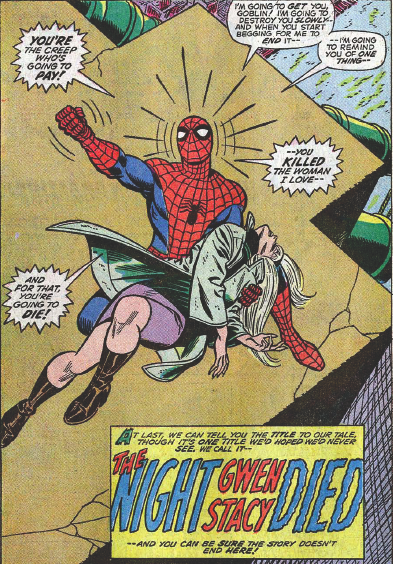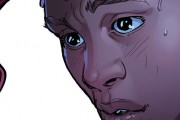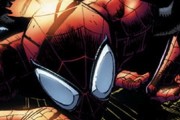I wanted to refer you to an enjoyable read over at The Capital in Annapolis, MD, which hits upon a point that currently has a lot relevancy in the world of Chasing Amazing: the “death” of superheroes. “Death,” of course goes in “quotations,” because as the article aptly notes, “death” in comics is almost never permanent:
Such is the life – and death – of superheroes and the reason the demise of a beloved character doesn’t garner even more angst among collectors. “It just happens so much. Death in comics is such a constant,” said Steve Anderson, owner of Third Eye Comics in Annapolis.
And heroes never really die, they just fade away. Briefly.
“They always say the superhero retirement plan is death,” said Matt Thorpe, a 26-year-old comics fan from Annapolis.
Added Billy Vogt of Capitol Comics in Annapolis: “It’s daytime drama for guys. It’s accepted that death isn’t permanent.”
Currently, the Amazing Spider-Man universe is dealing with death with the demise of the Johnny Storm/Human Torch. With Spider-Man joining the Fantastic Four/Future Foundation and replacing his good friend Johnny, a brand new comic book series that is concurrent with the Amazing Spider-Man universe has been released, piquing my interest as both a fan and collector. So I’m obviously a little curious to see how permanent Torch’s death is, because it will ultimately impact Spider-Man’s involvement in the FF series. Needless to say, if FF goes back to being the Fantastic Four again, sans Spidey, my interest in buying the series on a regular basis is going to wane.
The Capital article quotes some comic book fans who say superhero deaths are a perfect way to repackage an outdated character and to eliminate their baggage. It also doesn’t hurt sales for publishers and shopowners:
The Torch blew himself up to save the other three members of his team. Anderson usually sells about 100 issues of each Fantastic Four comic. He sold 700 when the Torch was extinguished. For the record, Johnny Storm has yet to regain his spark.
A senior Marvel executive outright admitted recently that angering the fanbase is a surefire way to create interest in the product. You can’t argue with the results. But this attitude has also made me very fearful of what Marvel may attempt to do with the Amazing Spider-Man. He’s one of their longest-standing and most popular characters who has been cloned and seen his marriage dissolved by the devil in past controversial storylines, but never outright killed. Does that make Spidey a prime target for Marvel’s Sword of Damocles?
If you go by Marvel’s alternative “ultimate” universe, it’s already happening. Peter Parker/Spider-Man is being killed off and the Ultimate Spider-Man series is getting a reboot. Outside of ranting about the polybag giveaway being associated with the death of Spider-Man issue, I can’t say I’m feeling any emotional distress about this Marvel decision because I’ve never been into collecting the “Ultimate” series. You might as well be telling me they’re killing Hulk or Wolverine because my connection to that character is nonexistent. I know this logic sounds impractical to nearly anyone – Spider-Man is Spider-Man – but you got to trust me on this one. Ultimate Spider-Man doesn’t matter.
But if they killed off Peter Parker in Amazing Spider-Man? I’m terrified of that possibility, even if death is as temporary as it has been for comic book legends such as Superman and Captain America. While some may see the idea of “killing off” a superhero as a means to an end, I see it as being lazy. It’s the comic book writing equivalent of painting yourself into a corner – there’s nowhere else to go, so you just burn the house down and start all-over again. Death is never meaningful, unless it’s permanent. I still, to this day can’t accept the current incarnation of Norman Osborn/Green Goblin as a legitimate supervillain in the Marvel universe because they had him dead and buried for so long, in such spectacular fashion, that his resurrection towards the end of the Clone Saga in the 1990s was absurd. But the deaths of Peter’s Uncle Ben and his girlfriend Gwen Stacy are significant milestones because they’ve remained permanent. The death of Uncle Ben taught Peter/Spider-Man his greatest lesson, “with great power comes responsibility.” The death of Gwen Stacy ushered in an era of comics where the stakes and consequences for all of those involved in the superhero universe were seemingly higher.
When DC killed off and subsequently resurrected Superman in the 1990s, what was ultimately accomplished by that decision? Sure, it ticked off a bunch of comic book speculators who bought and hoarded copies of the “Death of Superman” issue because they thought it was going to be worth a ton of money, but other than that, was the world of Superman that dramatically different where his death went on to mean something? If I’m sounding ridiculous here, please correct me.
And if Marvel decides to bring back Human Torch (maybe about a year after they killed him, in time for Fantastic Four #600?) what will be the purpose of that editorial choice? Will the FF issues co-starring Spider-Man have simply run their course leaving Marvel with the need to reboot one of their oldest series in order to generate some buzz about the Fantastic Four again? Wouldn’t it be something if Marvel stuck to their guns here and kept Human Torch deceased? Sure, it may shock readers who have come to suspect an inevitable resurrection, but it would also be an extraordinary stand by Marvel to say “yes, our writers can do better than that.”






First off I love the blog, especially the stories about getting the comics. I also think back at times I purchased certain issues, like my first “expensive comic” when I was eleven. It was Uncanny X-men 275 and it cost me $14. Two weeks worth of my allowance. Not a great issue, but it had a gatefold cover and it’s still one of my favorite issues because of that memory. Now it’s worth less then five bucks, but whatever, I coudn’t put a price on my memory of seeing that issue behind the counter everyday for months before i dedided to finally blow a wad of cash on it, instead of candy and video game and movie rental. Anyway the reason I am writing is I think your being a little harsh on the whole death thing in comics. It isn’t always lazy storytelling, sometimes the stories that come out of them are entertaining. When Superman died, i got to read the Reign of Supermen storyline that followed, where four new supermen appeared and we didn’t know which one was the real one. “spoiler alert” he was a fifth one that had not yet appeared. This fact would have pissed me off except, the story was very entertaining, and the mystery again is something i will remember nostalgically. Going to the comic shop every week hoping for another clue and seeing these new Supermen characters interact and confront one another, seeing the world react to the new characters, and Supermans peers react. None of this could have happenend to this great effect without his death. Also Batman having died like three or so years ago. Dick Grayson replaces Bruce Wayne as the new Batman, he encounters Bruces old foes and new foes just for him. Bruce Wayne had not really died, we find he was sent back in time, and got five issues of him traveling forward until he got back to the present. Seeing Batman in caveman times and Puritanical America was really cool and something different for Bruce Wayne then the same thing in Gotham city. The Human Torch is a great character, and I don’t think he should stay dead, think of how much more could be done with him. And without his death you wouldn’t have the cool new FF comic you are reading, right?
The point is you can’t lump all the death storylines in one pile. Some are done just for shock an awe, As the death of Mr. Fantastic was back in the early 90’s, and was a horrible comic, so don’t go looking for it.
Others are good stories or set ups for good stories.
Gwen Stacy should absolutely stay dead, and to a lesser extent Norman and Harry Osborne should have as well. But I also think about all the younger readers who are just getting into comics, and didn’t get to experience the Osborne characters because it was so long ago. Also I feel that a lot of the moments are only really meaningful to the old school readers such as you and I. The death of Gwen Stacy was a big moment in the Spiderman mythos, and big moment to you. But in say thirty years or less when the story is like 70 years old, is it going to mean anything then, for the new readers and collectors? For most of the readers it’s just a point of reference, I bet a large group of the Spiderman readership hasn’t even read the story. Thus the popularity of Ultimate Spiderman, and the ability to read from a universe only ten or so years old.
Comics are a unique medium where the characters are handed down from one fan to another in a way. Almost like mythologies where the stories represent the society and the times we live in. Sometimes there just entertaining, forms of escapism. They can’t be written in stone, that’s just not what they are about.
I don’t think certain characters should be resurrected, I’m still not happy about Captain Ameicas sidekick coming back. Of course now he is Captian America, so i guess there was a reason behind it atleast, but it still felt like going back and changing the plot of Hamlet to me. But I have freinds who read Captain America incessently now and have gone back and read his old stories, all because the return of his sidekick and his death piqued their interest. So who am I to say it was a bad idea?
Anyway, I have ranted enough, just wanted to give you a different perspective on this issue.
Thanks for the comment Ryan. I’m glad you were able to get some enjoyment out of the post-Superman death thing and I’m sure you’re not alone. And I think you make a great point about the generational aspect of comic books and their mythos. Something that is significant to you or me will have much less mean 30-40 years down the line. When Gwen Stacy died in the 70s, it was a milestone event. Things like that just didn’t happen. Now it’s too common place.
I still contend that writers have to be careful of painting themselves into a corner and just killing off a character because they run their course and they’ll bring them back when they have fresh ideas. I’m really enjoying FF right now, so if they bring Torch back (and they will) I just hope that it comes with change and growth and something significant. What was the point of bringing back the Osbornes? The American Son storyline leading up to ASM 600 was fun, but their resurrection just feels out of place to me. Anyway, always feel free to write such well thought-out responses. I can talk comics for hours/days really.
Funny, I shop at all of these stores that are mentioned in the article and Billy is a good friend of mine. The world is a pretty small place.